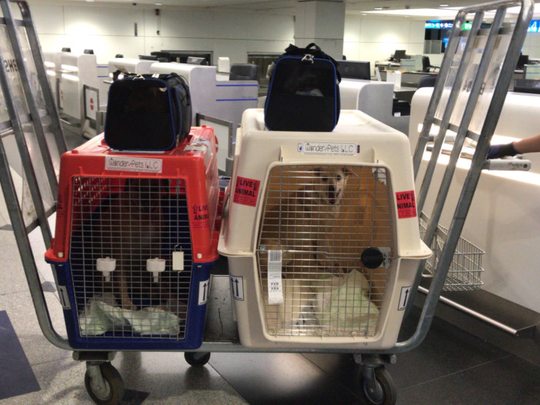
Dubai
Many people don’t take their pets with them when they leave the country. I didn’t want to be an example of such a person. So, when my children and I decided to move back home to Rome, Italy, we decided to take our 27 pets along.
In 2016, my husband became a victim of a multi-million-dollar fraud case and lost $200,000 (Dh734,650). We were forced to take the decision to move, while my husband will continue to work here, at least for now.
Initially, we got in touch with many companies that do pet relocations, but they were asking for a lot of money, between Dh50,000 to Dh60,000 for all 27 animals, nine dogs and 18 cats. But, since my husband works for an airline, we tried a different approach.
Travelling for us is not as expensive, because we get discounted tickets, although the discount doesn’t apply to the pets. So, my husband flew back and forth multiple times, taking a few pets along every time.
On the first and second trip, my husband and son took the smaller dogs, four of them, on an airline that allows pets in the cabin. These dogs were too small to travel in cargo. On the same trips, four other dogs travelled in the cargo hold, too.
On the third trip, one dog and eight cats were relocated. The remaining 10 cats were finally moved last week via cargo.
Looking at all the tickets we bought, we spent approximately Dh33,000 on the transfer. But, when these pets live with you, they become a part of your family. Why should we leave them behind? They were abandoned once, as all of them are rescue animals. We won’t do it again.
Each one of them has a unique story. While one of them was abandoned on the streets, another one was living in a villa amongst trash and insects. One of the dogs were being used for breeding and another just walked upto my husband with a leash in his mouth. It was almost as if he was asking to take him home.
Our home in Rome has a large outdoor space for all of them to play and there’s no issue of heat.
The process of transporting animals is a little difficult, though. When my husband asked around, a gentleman named Nabeel Haroon, owner of a pet store in Dubai and an animal rescuer himself, was extremely helpful in explaining the process to us. He took care of all the certificates required to move them. But, all the information is also available online. You just need time to look for it.
I believe that a person should do whatever it takes to take pets along when relocating. A lot of animal welfare organisations are also willing to assist with the process. Ornella Parigi, from Animal Action Association, helped me find all the crates to move my pets, I didn’t have to buy anything.
— The reader is a homemaker based in Dubai, but soon relocating to Rome, Italy.
Be a community reporter. Tell us what is happening in your community. Send us your videos and pictures at readers@gulfnews.com
FACTBOX:
Montserrat Martin, founder of animal rescue group The Animal Project, explains why so many animals are found abandoned in the country.
She said: “Many expatriates come to the UAE, work for a short time and then leave. They have a new lifestyle here and get things that they don’t think about in their home countries. This includes a pet. But, they never make provisions of what to do in the future if they leave.”
So, if they do decide to leave the country, they usually pass the pet onto a friend, who is not attached to the animal and ends up either abandoning it or putting it up for adoption.
Martin said: “We find animals in such terrible situations. There are so many animals in the UAE looking to be helped. If you aren’t sure and not planning for 15 years ahead, simply foster. A lot of animals are being put to sleep because they don’t have homes. So, contact animal welfare groups and be part of the solution, not the problem.”
Additionally, if relocating pets with you when moving, the basic requirements to relocate your pet include an export permit, an official veterinary certificate, a valid rabies vaccination between one year and 30 days, proof that the animal is microchipped, and a travel box that meets International Air Transport Association (IATA) guidelines. Each airline has different rules when it comes to transporting animals, so it is recommended to check before booking tickets.








